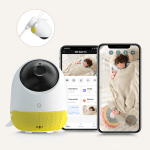
When you first get pregnant, there are so many things on your list of “must-haves.” (And probably an equal number on your list of “nice-to-haves.”) For most parents, a baby monitor is on one of those lists.
Would it surprise you to hear that Nicole sometimes urges families to ditch their baby monitors (at least temporarily)?
No, we’re not advising parents to be negligent! We recommend that some families put away their baby monitors for a different reason. Read on, as we explore how baby monitors can impact your baby’s sleep!
Some Families May Need Monitors… Other Families May Not
Let me start by saying all families have different styles of parenting, and everyone’s house is a different size and shape.
If you have a 500 square foot apartment, then you will likely have no problem hearing your baby from anywhere in your home. You probably will not need a baby monitor. However, a family that has a 3,000 square foot home with 3 floors may very well need monitors placed strategically throughout the house.
What About Movement Monitors?
Of course, not every family buys a baby monitor strictly to hear the baby when she cries. Today, there are monitors that detect movement designed to help reduce the risk of SIDS. Movement monitors can alert parents when a baby hasn’t moved in a certain amount of time. An alarm sounds letting parents know that the baby has been completely still for too long.
And, there are monitors that detect heart rate and oxygen levels.
Some families have truly incredible stories of actually catching their not-breathing baby in the nick of time and intervening before something truly awful happened. However, other parents report lots of false alarms, resulting in unnecessary middle-of-the-night wakings and more anxiety for everyone.
In this post, though, we’re going to focus strictly on sound and video monitors, and how they impact sleep.
Baby Monitors and Baby Sleep:
The Good
There is a distinct up-side to sound monitors (both the video and the non-video versions). A monitor is great to help you…well…monitor your baby’s crying.
Is it a hungry cry? Uh oh. Is he distressed? Perhaps that’s his falling asleep moan? Or is his leg stuck between the crib slats? (You’d need a video monitor to see that one, of course).
This is all easier to do with a monitor than putting your ear to the door or poking your head in the room while trying not to let your baby see you. (Or maybe even doing an army-crawl across the nursery floor, to do some reconnaissance!)
Baby monitors are also great if you have a large home. If your baby sleeps on the second floor, for example, and you and your partner want to watch a movie in the basement, a monitor can give you peace of mind. The same is true if you want to take your older children outside to play in the yard, while the baby naps.
A monitor allows you to do these things without needing to worry that you’re leaving the baby unattended.
And, of course, baby monitors can be really helpful during sleep training, too, for the same reasons. Parents who use no-cry sleep coaching methods and stay in the room may not need to use a monitor. But, if you use any kind of cry method of sleep training and leave the room, you’ll want to keep tabs on your baby’s cries. A monitor makes it easy to do that.
However, while baby monitors can definitely be helpful, they can also become a problem.
Baby Monitors and Baby Sleep:
The Bad and The Ugly
The good thing about baby monitors is that they let you hear your baby’s every cry. But the bad thing about baby monitors is…that they let you hear your baby’s EVERY CRY! (And sniffle, and squeak, and moan, and hiccup, and…you get the idea!)
In the newborn stage, you’ll no doubt find that your baby makes lots of little sounds throughout the night. A baby monitor amplifies all of those, and so every sound your baby makes will probably wake you from your own precious, much-needed sleep.
And, if it sends you running to check on your baby (a perfectly normal new parent instinct, by the way!), you may end up inadvertently waking up your baby – something which no parent wants to do!
This was the case for Nicole when her oldest son (who inspired the Baby Sleep Site®) was a newborn:
When my eldest was a baby, he was a loud sleeper. Every time he rolled over or made a little noise or coughed, I could hear him through the monitor. This was unnecessary and woke me up literally for no reason. Because of the way the bedrooms in our house are situated, I could hear him very well without the monitor. I birth screamers, by the way! So eventually, I turned off the monitor at night when I slept.
Baby Monitors During Sleep Training
As your baby gets older, you may come to the point when you decide to sleep train, to help your baby sleep through the night. While a baby monitor may help you with sleep coaching, it can also hinder your progress. Having a fuss or cry magnified in a monitor may make your heartbeat twice as fast and make you think that someone is either kidnapping your child or that he is facing extreme harm.
Of course, some babies may have medical conditions that require parents to check-in frequently. In those cases, yes, parents will probably want to listen for every little sound. But, for the average healthy baby, we don’t need to hear every little noise the baby makes. Remember, fussing and crying a little between sleep cycles is very normal and expected. But if you respond to every little fuss or cry, you may inadvertently get in your own way. In that case, your baby will not have the opportunity to learn to fall asleep on his own.
Here’s Nicole’s story, about the moment when she learned that allowing a few minutes of fussing can actually produce good results:
One day, as I was making my eldest son’s lunch, I heard my younger son crying in his room. I couldn’t get to him right away — I had to finish up making lunch first, so that my oldest son could eat (can you say cranky when hungry?) It took just a few minutes (less than 5) to finish up, and then began walking up the stairs to check on my younger son (who was still crying).
I kid you not, I got so far as his door (and actually put my hand was on the doorknob!) and suddenly, his crying stopped. My son had fallen back to sleep! I am not suggesting all babies will be that “easy” (he was by far not a perfect sleeper, by the way)! But having a monitor where you hear everything is not always the best tool in your toolbox!
Remember, a baby monitor is a tool. And as with so many tools in your parenting toolbox, it’s not the tools themselves, but how you use them that ends up making the difference. If your baby monitor is proving to be a tool that’s helpful, then by all means… Use it! But if your baby monitor is waking you unnecessarily at night, or making you tear your hair out during sleep training, then it might be time to put it away (at least, for a while)!








